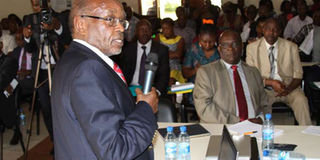Public editor goes preachy and prescriptive while avoiding the facts

The Nation Media Group's public editor Peter Mwaura speaks at the Kenya Agricultural and Livestock Research Organization in Thika on February 3, 2016. PHOTO | ANTHONY NJAGI | NATION MEDIA GROUP
What you need to know:
- Where specifics are highlighted, the public editor missed his own lesson and unfairly criticised writer Nyambega Gisesa for laziness when, in fact, it is his reading of Gisesa that is lazy.
- I wonder if the public editor will agree that as a historian, I know something small about facts and interpretation.
The Nation Media Group’s public editor Peter Mwaura has gone preachy and prescriptive. Basing his sermon on a problematic notion of facts, he invited all columnists to an idea of objectivity contained in a single piece by Dr Joyce Nyairo. But his sermon mostly lacked history and specifics. Where specifics are highlighted, the public editor missed his own lesson and unfairly criticised Nyambega Gisesa for laziness when, in fact, it is his reading of Gisesa that is lazy.
Surely the public editor knows that the one constant in the struggle for democratisation in Kenya has been the fight to protect the right to peaceful public protest. No constitutional or legal regime changed this fact and Uhuru Kenyatta, William Ruto and Mwai Kibaki benefited from it, but asphyxiated it when it did not serve their political interests. Gisesa didn’t have to research more to make this rather obvious point.
There are perhaps too many people who read Dr Nyairo only in the newspaper. We started reading her works co-authored with Prof James Ogude many years ago in academic journals. She is a serious thinker who has a sharp mind that can turn things over in ways you may not have anticipated. I can understand why the public editor would find her writing worth recommending. But he stretches things too much when he presents hers as the column to emulate.
First, it is unbelievable that a public editor would dismiss columnists claiming a lack of facts but not present one column to illustrate the absence of facts. Second, in the one instance where he provides such an illustration, he ends up disagreeing not with facts but interpretation instead. The Nation Media Group has many columnists who subscribe to different ideological and political orientations. I believe this is deliberate and makes vital contributions to the newspaper. Some of us have publicly declared our political persuasions and hold no apologies for it. Others prefer not to reveal these persuasions while trying to hide biases that still come through anyway.
It is easy to know when a particular columnist is attacking the other political side due to bias alone. In older days, some of these columnists preferred to write in public newspapers under a pseudonym. Has the public editor never seen this bias in Dr Nyairo before? When he decided to recommend her column, he assumed the kind of amnesia that makes for a really bad public editor. I wonder if he went back to the articles by George Kegoro to find out if Dr Nyairo’s dismissal was on factual grounds. What is it that Kegoro wrote or Ahmednasir Abdullahi said that was not sound or factual?
Perhaps it does not matter to the public editor that Dr Nyairo and Dr Willy Mutunga had a professional relationship at the Ford Foundation before the latter became the Chief Justice. Our positive or negative engagements with many of the people we write about finds its way into the interpretation we give in our columns. Obviously in the eye of the public editor, only Dr Nyairo is immune from this and we all now are “sermoned” to follow in her footsteps. If we all consciously decided to follow the example in her political (not cultural) commentary, both in their creative critical advantages and also in their glaring biases, the Nation Media Group would cease to describe itself as independent.
I am making here a point about facts. I wonder if the public editor will agree that as a historian, I know something small about facts and interpretation. After all, Edward Hallett Carr’s What is History? was compulsory reading. Carr writes: "The historian is engaged on a continuous process of moulding his facts to his interpretation and his interpretation to his facts. It is impossible to assign primacy to one over the other". Remove the word historian and insert journalist and the statement remains valid.
Godwin R. Murunga is a senior research fellow at the Institute for Development Studies at the University of Nairobi.





